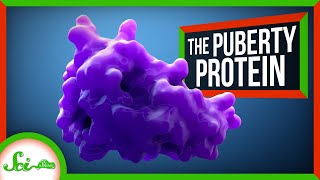If you've gone through puberty—and especially if you've ever looked back at your seventh-grade yearbook photo—
如果你已经历过青春期——尤其是如果你回顾7年级的年鉴照片——
you might remember that time of your life with a little bit of a cringe.
你可能会带着一点畏缩地回忆生命中的那段时光。
But no matter how you felt about it, from a scientific standpoint, puberty is pretty impressive.
但不论你有什么感觉,从科学角度来讲,青春期令人印象深刻。
So much goes on in bodies as they transform from a child into an adult.
从孩子变成大人,身体发生了很多变化。
But as complex as it is, just one hormone is the key to controlling it all—and it isn't testosterone or estrogen.
但尽管它很复杂,只有一种荷尔蒙是控制它的关键——不是睾丸激素或雌激素,
It's a modest-sized protein that you have probably never heard of. For a long time, researchers didn't know what kickstarted puberty.
而是一种你可能从未听过的普通大小的蛋白质。很长一段时间以来,研究人员并不知道是什么导致了青春期的开始。
They knew a lot about what happens in the body during it, and that somehow, it gets going around the time kids are between 10 and 12,
他们知道在这段时期,身体会发生很多变化,而这些都发生在10到12岁之间,
but they didn't know what flipped the switch. In fact, it was 2003 before researchers found the first clue.
但是他们不知道是什么触动了这个开关。事实上,直到2003年,研究人员才发现了第一条线索。
Two separate teams—one in Massachusetts and one in France —actually stumbled across that first clue separately, right around the same time.
两个团队——一个在马萨诸塞州,一个在法国——同时分别发现了第一条线索。
Each team had been studying adults with a disorder called hypogonadotropic hypogonadism, or HH.
每个团队一直都在研究患有低促性腺素性功能减退症(简称HH)的成年人。
People with HH never produce significant amount of sex hormones, so they don't naturally go through puberty.
HH患者无法产生大量性激素,所以他们不能自然地经历青春期。
And the researchers were trying to understand what gene defect was causing that.
研究人员试图弄清楚是什么基因缺陷导致了这种情况。
To do that, each team independently analyzed the genomes of related adults who had HH.
为此,每个团队独自分析了患有HH的相关成年人的基因组。
They figured that if they could just find a mutation that these family members had in common, that was probably the source of the disorder.
他们发现,如果他们能够找到这些家族成员都有的一个变异,那么这可能就是这种疾病的根源。
And they found it: The family members with HH all had a certain receptor protein that didn't work.
他们发现了它:HH家族成员都有一种不能工作的受体蛋白质。
Receptor proteins are like little landing pads on or inside cells that intercept certain substances, like other proteins.
和其他蛋白质一样,受体蛋白质就像是拦截某种物质的细胞上或细胞内降落垫。
Once a molecule latches on to the receptor, the cell responds in some way.
一旦一个分子附着在受体上,该细胞就会以某种方式做出反应。

And the faulty receptor on the patients with HH was the one for a protein called kisspeptin.
HH患者的这个缺陷受体是蛋白质Kisspeptins上的。
Kisspeptin had just been discovered seven years earlier, but no one was really thinking about it in the context of puberty.
Kisspeptin是在七年前才被发现的,但没有人真正把它放在青春期的背景下考虑。
Instead, the main thing we knew was that the protein can stop cancer cells from spreading.
相反,我们所知道的主要事情是这种蛋白质可以阻止癌细胞扩散。
Researchers at a lab in Hershey, Pennsylvania figured that one out by identifying the gene that tells the body to make kisspeptin, and they called that gene kiss-1.
宾夕法尼亚州赫尔希实验室的研究人员通过识别告诉身体制造kisspeptin的基因找到了一个,他们将这种基因称为kiss-1。
So, if you're wondering why this protein is called kisspeptin, it's because kiss-1 was named in honor of Hershey's Kisses.
所以,如果你们想知道为什么这个蛋白质被称为kisspeptin,这是因为它是以好时之吻而命名的。
So, for the first few years after its discovery, kisspeptin was super interesting in cancer research, but that was about it.
发现它后的最初几年,kisspeptin在癌症研究中很受欢迎,但仅此而已。
Except, now, the new research suggested that this protein played a much bigger role in the body than anyone knew.
除了现在新研究表明这种蛋白质在人体中起到了更大的作用。
After all, the whole reason the people in those studies had HH —
毕竟,这项研究中的人都患有HH的原因——
and didn't develop into sexually mature adults without treatment— seemed to be because their cells weren't picking up kisspeptin.
并且在没有经过治疗的情况下,没有发育成性成熟的成年人——似乎是因为他们的细胞无法吸收kisspeptin。
So this little-known protein named after a chocolate kiss seemed to be key to kicking off the biological transition from child to adult.
这种以好时之吻命名的鲜为人知的蛋白质似乎是触发儿童转变成成年人的关键。
Researchers worked out that, just as kisspeptin tells cancer cells to stop growing,
研究人员发现,就像kisspeptin告诉癌细胞停止生长一样,
it can also trigger responses in other cells—including the release of hormones that kicks off puberty. And it all starts in the brain.
它也可以触发其他细胞的反应——包括释放触发青春期的荷尔蒙。并且一切都从大脑开始。
At the beginning of puberty, kisspeptin binds to receptors sitting on a group of neurons at the base of the brain,
在青春期初期,kisspeptin与大脑底部一组神经元上的受体结合,
and that basically sets off a biological Rube Goldberg machine. First, the kisspeptin makes those neurons release some hormones.
这就产生了一种生物鲁布·戈德堡机械。首先,kisspeptin让这些神经元释放更多荷尔蒙。
Then those hormones travel into tiny blood vessels that wrap around the pituitary gland, right under the brain,
然后这些荷尔蒙来到环绕脑下垂体的微小血管,脑下垂体就在大脑的正下方,
and they tell it to release two sex hormones, called gonadotropins.
并且它们告诉它释放两个性荷尔蒙——促性腺激素。
These gonadotropins head over to the sex organs to signal that it's time to start maturing.
这些促性腺激素进入性器官,发出成熟的信号。
In response, bodies with ovaries start producing estrogen and developing mature eggs, and bodies with testes start producing sperm and testosterone.
作为回应,女性开始产生雌性激素并发育出成熟的卵子,而男性开始产生精子和睾丸激素。
But these sex hormones don't just go to the reproductive system.
但这些性荷尔蒙不仅仅只进入生殖系统。
They also land on receptors all over the body and tell cells to do a number of new things, like start growing hair in new places.
它们还停留在体内各个受体上,并告诉它们做一些新任务,比如在新的地方开始生长毛发。
And that's the beginning of puberty.
这就是青春期的开端。
So, if kisspeptin never successfully binds to its receptors in the brain, the whole process never gets started.
所以,如果kisspeptin没能成功和大脑中的受体结合,那么整个过程就无法开始。
As for how kisspeptin knows when it's time to go bind to those receptors in the first place—that's still a bit of a mystery.
至于kisspeptin如何知道何时开始与那些受体结合——这仍是个谜。
It might be responding to metabolic changes, which could signal that the body has reached the right size to begin transitioning to adulthood,
这可能是回应代谢变化,代谢变化是身体达到了合适的大小,可以开始过渡到成年的信号,
but scientists are still trying to understand that piece of the puzzle.
但科学家们仍在试图弄清楚难题这个部分。
What we do know is that the complex process of going from child to an adult has everything to do with a very little-known protein, named for a very little chocolate treat.
我们所知道的是,从儿童到成年的这一复杂过程和这个以小巧克力命名的鲜为人知的蛋白质密切相关。
Thanks for watching this episode of SciShow! And to find out more about what happens to the body during puberty,
感谢收看本期节目。想要了解更多青春期身体的变化,
you might like our episode about what goes on inside a teenage brain. You can watch it right after this.
你可能会喜欢我们关于青少年大脑的那一起视频。大家可以去看看。


